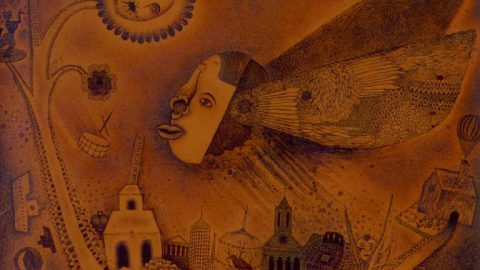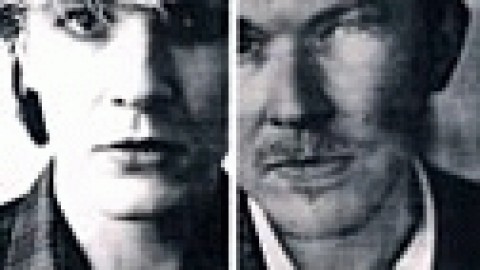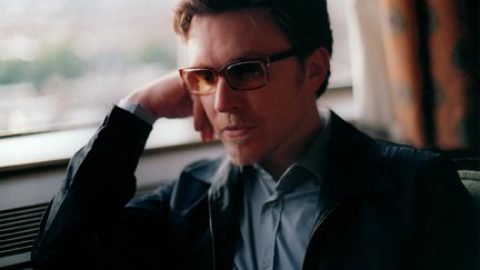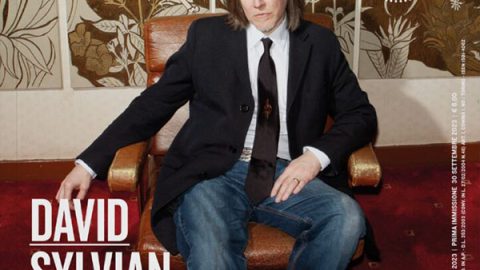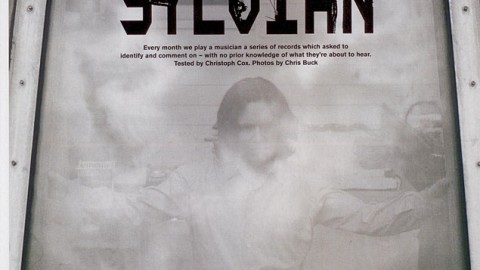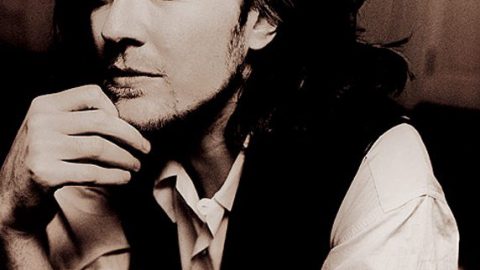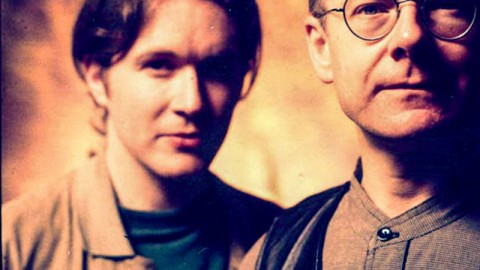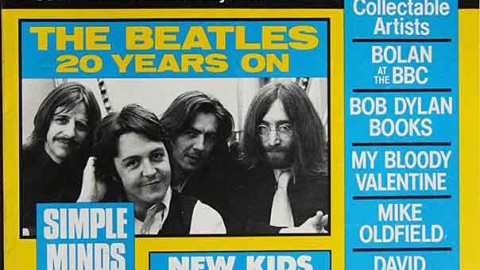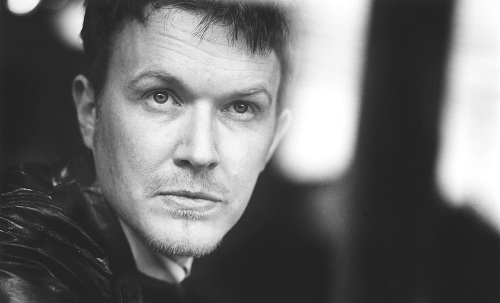
David Sylvian undertook an internet webcast interview in September 2000. The video can be seen elsewhere on this site (here). Sascha Paulick produced this article at the time (originally in three parts) including a transcript of the event for the David Sylvian fan-page, Slow Fire, and has kindly given permission for the text to be shared on this site.
Sitting in for his first webcast interview ever, David Sylvian looks very aristocratic with sunglasses and the yellow jacket. The first question from interviewer Robert Sandall comes natural: if he does much online himself. Very little, just basic communications, replies David. Sandall: “You don’t see this as a future way of getting your music to more and more people?” David: “That depends what the future holds for me. In terms of how I’m working and whom I’m working with. Ya, I see the potential for sure. But right now it doesn’t necessarily interest me to that extent.” Now Sandall starts with the questions asked by fans. The first questioner wants to know if David has a large collection of unreleased work. David: “There was a fair amount of unreleased materials lying in the vaults and I thought this was an appropriate time to get to it. For a number of reasons: Primarily because the industry is changing and there is no real security when working with the major labels – I’ve been with Virgin for 20 years, but whether I’ll be with them three months from now, we don’t know. So let’s say, I was not to be with them in three months from now I would no longer have access to this material at all. And as the material was unfinished it would never be released, so basically a lot of good material would have been lost. Also would no longer have access to my earlier work, the back catalogue, in all probabilities. So I thought it was an appropriate time to get to grips with all of that and bring to a completion some tracks which I thought were quite important and certainly worth a listen. They were by no means sub-standard tracks. They were either not included on the albums they were originally meant to complement because of time and budgetary constraints or because of contextual problems. But I really felt they were strong pieces. Are there anymore tracks? One or two. I would like to do an instrumental compilation at some point and would like to present a greater overview of that branch of my work.”
Just wait a second. What do we read here? He doesn’t know if he’d be with Virgin three months from now? And this being one of the reasons he is finally putting out the compilation (Virgin asked him six years ago to do it). David seems to be very unhappy with his record company he’s been with for so long. Seems they are not giving him the support he desires. Remember there was no video made for his first single from DBOAC ‘I Surrender’ and now Virgin even withdrew the single supporting Everything & Nothing ‘The Scent of Magnolia’. In a recent radio interview with the BBC London he said: “It’s odd, I’m still with a major label; who knows for how long. But I’m with Virgin for 20 years and although there are major changes going on I am still able to work within the system without conforming to it. I’m quite happy to move away from the major labels to work independently, should that be the case.” He goes on: “I would like to perform but only under the right conditions. And again because the climate, the conditions, aren’t right now but maybe in time they’ll be right again. Right now I couldn’t put a band together and take it out on the road, it wouldn’t be financially feasible. But should the conditions be right again I would like to give it a crack again. The tour with Robert and the solo tour in 95 have been an eye opener for me. I had never really enjoyed touring that much up until that point. And now I am quite open to the idea of going out on the road again and performing material.”
So no live dates in the near future. So much is clear. Back to the webcast. Sandall asks why he chose to rework some of the tracks. Particularly why he revocalled Ghosts but did not rework the instrumental track. David: “I did not want to interfere with the music. I purposely didn’t add anything, didn’t over-dub on the tracks outside of the vocals. … I resang certain songs because I felt I could bring more to those compositions now than I could back then; both technically as a vocalist but also emotionally. Particularly to a song like Ghosts. I wanted to create a greater continuity throughout the album as a whole. The vocal style has changed over the years, so I made a decision to resing anything that was recorded prior to 84. And it brought me back in time when I was actually physically standing there with headphones on performing the piece in a way I found pleasantly nostalgic – much to my surprise (laughs). That was nice. I found that a lot actually going back over the older material. ‘Cause actually I don’t do this, I don’t listen to my own work. After listening to this work for the first time in many many many years… and it was an interesting experience. Not something I want to relive… Not something I am going to do that often in life. I much rather work on new material, but as a one off it was really informative and kind of a bitter sweet experience. Because after all, this is representative of the best of my work, so to speak, of the past 20 years of my life. And you look at the work and you say ‘does it justify 20 years of my life?’ Of course it doesn’t! Even if I’d recorded St. Pepper or whatever it wouldn’t justify all of that effort. Your work never does when you look back on it. So it’s this bitter sweet experience because there is something of worth and value there also. But it never justifies that amount of your time, that much of your life. It can’t possibly live up to that.”
Any outtakes from the Rain Tree Crow sessions? “No outtakes from the Rain Tree Crow session, no likelihood of there being another Rain Tree Crow album either. Thoroughly enjoyed making the one that we did make. Relationships were damaged as a result of unforeseen circumstances that arose toward the end of the recording. But now there is no ill feeling between anyone of us but there is also no real desire to reunite. I work very slowly and I have many ideas for different kinds of musical projects that so often get pushed to one side in favor of the one that currently grabs my attention. I don’t know if I’ll ever have enough time to cover all the ground that I want to cover to actually go back and work in older setups is less inspiring than working within new ones.”
David then goes on that he would like to work in a group again. It could be in the context of a live performance. Then they talk about how former collaborations came into play. “Usually the arrangement cries out for certain voices”, says David. While working on Brilliant Trees he heard the trumpet of Jon Hassell. It’s a question of making that connection. Did he ever had any vocal training? “Never had any vocal training. It has just matured with time and… not an awful lot of effort (laughs)…. time. No, I don’t practice singing. I only sing with my children.”
Q: Do you see your music as a place to seclude? “I hope that the music encourages introspection. I hope that it would be a place for people to feel far freer to open their own hearts. You could say that the desire is to open hearts with music. To blow them wide open. So that they are vulnerable to themselves. So much of our daily existence has to with do with us closing up; concealing ourselves from ourselves. So if we come in contact with what opens us up, it must be seen as something that is valuable. So that would be the primary object I would say. And from that point onwards they would feel secure within themselves, within the embrace of the music, within the embrace of the work to take a closer look. And maybe it would affect the quality of the kind of questions they might ask at themselves. I think that’s the most you can ask for.”
Which I personally feel is absolutely true. I remember a similar quote from an interview from 1991 where he said that “sometimes the question is more important than the answer. The quality of the question.” Which instantly rang true to me. I think it is very important that we ask ourselves certain questions we most likely will never find an answer to, because they are so deeply rooted in our very existence as human beings. And music can help finding those questions, just like any kind of art; literature, painting or whatever. Which is always closely linked to the spiritual belief. So how did he become involved in Eastern religions and are his parents Christians? David: “I come from a family that wasn’t overtly religious in any way whatsoever. I began to question that (Christian) belief at some point and wanted to look further into it. That was the start of quite a long and obsessive journey for me. Ultimately I felt more toward the Buddhist practice because it was so clear cut, so well defined, it was pure practice. But at the time in my life when I sought out a teacher I came across teachers from a Hindu background. This happened to me on a number of occasions and ultimately that has played a large influence. It’s developed my own practice. My own practice is an amalgam of certain Buddhist approaches and the devotional aspect of Hinduism. But it is all directed towards my teacher. So I follow now what I would call a devotional path – Bhakti yoga. Which is to surrender to my teacher’s will which is a very difficult thing to do. Because in the west we are particularly taught to let go of one’s own will is to let go entirely. So we are talking of an act of surrender. So an act of surrender, in this context, isn’t a once in a lifetime event, it’s something that’s ongoing with every moment. You have to be reaffirmed in every moment. Otherwise you would just slip back into old ways of thinking and acting. So it becomes a form a meditation. And that is the practice I subscribed to. It began to really show itself after breaking up the band; 82, 83.”
Q: What became of the collaboration with Scott Walker? David: “Nothing obviously. (laughs) I originally sent a composition to Scott just to see if he’d interested in recording it. It was actually ‘Ride’ which we now hear for the first time on Everything & Nothing. I felt it would have suited Scott’s vocal style. And he responded well and asked to meet up. And we did. We talked about recording albums. The initial idea of recording one track just involved into multiple albums. For some reason I never fully believed that this was going to take place. But if I could be, in any way, of assistance of helping Scott get back into the studio recording again, I thought, that’s fine by me. I needn’t be involved in the project. So I was basically there for that purpose, I felt. Until such a time as events took over and he was finally liberated from the contract that he was in at that point in time, and was able to move on and record on his own without any assistance.”
Q: “Can you recall any personal favorite recording sessions or appearances where something ‘clicked’ and made it particularly rewarding?” David: “Heartbeat comes straight to mind. Because that was the piece that brought Ingrid and I together. So that piece is immensely important in my life. Ingrid and I got together two weeks prior to the actual sessions. And fought tooth and nail for the two weeks that we were initially together, ’cause I think we felt that something was about to happen; the forces drawing us together and we fought like crazy. By the time we headed into the studio to record the track we had totally succumbed to one another. And I just remember the two days of session work that we did on the Heartbeat track and it fell together so beautifully. The backing track was already there, Ryuichi had already recorded it, and I just brought in Frisell and added my own and Ingrid’s vocal. I had written a part for spoken word but I hadn’t found the right artist to perform the part and this was the story that brought us together. She sent a copy of her album to me and I had just completed writing the song. And so to hear that voice was to know immediately who the appropriate person was for the song. And that’s what drew us together. Or one of the many things that appears to have pulled us together.”
Q: Any other key moments? David: “I really did enjoy the sessions I did with Jon Hassell and Holger [Czukay] on Brilliant Trees. Very interesting chemistry there between the three of us. And particularly the intensity that Hassell has brought to the sessions; really brought the piece alive for me. It was wonderful to be able to get that affirmation, to be able to make that connection between a certain voice and a composition. I was very nervous of the fact that after breaking up Japan I would be entering the studio with session musicians. You know, you work with a band for a number of years, everybody in that band is committed to the outcome of the composition; of the recording. So they give their all. And the notion of going into the studio with session musicians that just kind of swan in, lay down a solo, and swan out again. It didn’t appeal to me at all. The the success of those sessions with that caliber of artists, Jon Hassell, Holger Czukay, Ryuichi and all the rest, set in motion what was to be a method of working for me for the years to come. Particularly the work with Ryuichi Sakamoto was very important for me. We share a common vocabulary, which is so important, and it needn’t be verbal. It’s just the way we respond to one another in the studio. That’s very rare. Ryuichi is sort of a touchstone for me. When we go into the studio together we can immediately go further and further afield in terms of the input into the piece we are working on. We don’t have to establish or reestablish that common ground. So he’s the only person in my life right now that I share that with. …. I enjoyed the work of people who have that personal element or very personal voice. It doesn’t really matter in what genre they are working in. Normally they tend to be working in the outer perimeters of any given genre or cross-over. Hybrids are very interesting to me also. I hear something of a very personal nature in their work that pulls me to it.”
Q: “Do you ever long for Britain again?” David: “Living in England has been enormously influential. How could it be otherwise? I have lived here for the first 34 years of my life. Informative and very important. The move to America coincided with so many other events happening in my life. The period that I moved to the States and the first five years on from there have been very eventful, very enriching. It’s very hard for me to say what aspect has been the most influential or how living in America has influenced the work. There are so many factors coming into play. It’ very hard for me to separate them all: There’s meeting Ingrid, marriage, moving to America, having children, meeting spiritual teachers and guides. And then there is America itself. It’s just part and parcel of a life. I can’t separate all those different entities.
Sandall: “A lot of people, myself included, wondered whether you might have lived in California because of Californian’s strong meditative Buddhist traditions.” David: “I was drawn there because there were certain teachers there I wanted to be close to. But from the Hindu culture. There were a couple of ashrams there I was interested in. Living in closer proximity to. And we benefited from that enormously for the three years that we lived there. But for a number of reasons we felt we couldn’t put roots down, so we moved on. But to come back to original question: Yes, I do miss Britain. I miss aspects of the European culture in general.”
Sandall: “What aspects of European culture? Football presumably.”
David: “Yes, of course. … The most obvious one, because I like movies, is that you do not get enough of French movies, French directors. So you just don’t get enough of that in States, you have to actually search them out.”
Sandall: “You have lived pretty well all across America. You have lived in and around the Mid-West, you’ve lived in California and now you are living in New Hampshire.” David: “And I’ve driven all over it too; a number of times.”
Sandall: “Any preferences? I mean America is such a vast place to talk about it as one country is almost a nonsense.”
David: “Yes, I know. The landscape in America is so diverse. Some of it is so incredibly breathtaking! Not like anything I’ve seen in any other part of the world. Driving through Wyoming, through Arizona… For me the desertscapes were the most impressive.” Sandall: “They haven’t any good deserts in Hew Hampshire?” David: “(laughs) But the problem was I really missed the seasons. The seasons really shape a life. The winter is a time for introspection. And you don’t have time for that in California. Nothing wrong with that but it wasn’t suited to our lifestyle.”
Sandall: “Bit of an evergreen question here David, but I think it’s never a mistake to revisit it because it is quite important to you. You tried so hard to avoid celebrity status. What are you reasons for it? I mean, do they change?”
David: “No they don’t. You are either comfortable being in the public eye or you’re not. You chose to live a private life or you don’t. I chose to live a private life, it’s really that simple.” Sandall now hints towards the fact that he depends on publicity or public interest. David: “Yes. That’s problematic for me. Given the choice we wouldn’t sit here doing this. But I thoroughly enjoy the work that I do and this is part and parcel of that. To be able to do what I do I have to be available to promote the work – in some capacity. So I have to be prepared to come out and speak about it. Does it need me to speak about it? No. It’s perfectly capable of living a life on its own. But for obvious reasons, the way the industry works, it draws attention to the work.”
Q: “David, have you found the answer to the questions you ask in your music?” (long pause) David: “I wonder what that question would be.” Sandall: “There is a strong sense of a journey, of an ongoing spiritual enquiry.” David: “Yes, in that sense we’ve already answered the question: It’s ongoing. There is no end to it. All I can say that I have rooted myself in a lifestyle, philosophy, values that enable me to continue to grow. And I was very fortunate enough to find that footing when I did. So my life and my work is fairly rooted in that respect. I can look back onto the work that I’ve done, at least back till 82, 83, and still make a connection. I would express myself entirely differently now; in all probability. But I can still make a connection to the work that I am currently doing. Thematically there is that. There is something of a linear journey there I suppose. But I must say that spirituality is anything but linear! Somebody asked me today where would I put myself on a map towards the goal of enlightenment. It’s an odd question to say the least. And of course there is no such thing. You really don’t see where you stand. All you can see are the beneficial effects on your life and the people that surround you and you know that you have made some kind of progress.”
Sandall: ” I suppose what all these questions do highlight though is that for a lot of your listeners, your fans they do see you as, if not spiritual guide, at least a person whose spiritual enquiries are of relevance to their lives. Do you feel comfortable with that role?” David: “Yes, I think so. Because there is nothing dogmatic about my work; it’s really open to individual interpretation. It can embraced on a number of levels. So I don’t talk extensively about my own beliefs. And I don’t think it’s necessarily relevant that people know of them to enjoy the work, to take something from it.”
Q: “Does it still amaze you that you still have such an large fan base around the world, despite not being the traditional kind of pop star and not in the lime lights so much?” David: “I’m grateful that they are there. After being out of the public eye for so long in terms of not releasing any material for number of years. And I did wonder was anybody still out there, would anybody still be interested in the work. Does it surprise me? Yes, it does.” Sandall goes on if he has a certain audience in mind when writing the pieces. David: “No. Not at all I would say. With the exception of the compilation where I did envisage an audience if you like. But otherwise, no. Regardless whether anyone hears it or not, is has the possibility of transparance; of people sharing in that experience to some degree. So it is not necessary to think of any individual. I am often surprised by people that come up to me and tell me that they enjoy the work. The ages across-the-board, races across-the-board. I am surprised an delighted by that fact. If anything, if I was to hold a listener in mind, it would probably be to do with the mindset than any other consideration.”
Sandall: “Lots of enquiries about the roots of your inspiration. People want to know where you might be looking for future inspiration. Do you actually go around quarrying for musical fuel?” David: “Well I absorb a lot. ‘Cause I listen to a lot of music and right across-the-board. But I’m not really intentionally listening for possible avenues which I may follow. It’s really not with that in mind. It’s really the pleasure of being a listener searching out new voices. I’ve no doubt it plays into my work in some fashion but I don’t recognize the influences in my work anymore. Although I don’t doubt that they are there. I don’t recognize them as such. I mean the main influence is life experience, what is going on in my life, and that feeds directly into the work.”
Q: “Do you listen to classical music and if so what are your preferences? Also have you thought of venturing into any modern orchestral projects?” David: “I haven’t been listening to classical music as much as I have in the past. (long pause) Let’s leave it at that. It’s not calling out names from the past. Don’t think it’s really relevant. Mainly 20th century composers, without a doubt. But yes, I would like to be involved in orchestral works in the future. I’m not quite sure how that would take shape, but it’s actually that’s been in the back of mind for a short time now.” Sandall: “Would that involve writing music and mastering that rather tricky business with dots and staves ?” David: “(chuckles) Nothing as complicated as that Robert! I would actually like to tackle works by other people.” Sandall: “When you mean ‘tackle’, you mean sing them?” David: “Yes.”
Q: “What do regard as your most favorite song you have written and why?” David: “(even longer pause) Ya, it’s always difficult, isn’t it? I consider ‘Dead Bees’ to be the clearest statement I have made, so my most successful album, most gratifying. Favorite song? I would pick ‘Wanderlust’ maybe, ‘I Surrender’ is very important. One of those two.”
Sandall: “Various people have asked what your current interests in visual arts are: favorite artists, techniques etc.” David: “I’m terrible at pulling out names out of the hat.” Sandall: “Perhaps you could just talk generally about it. All through your career you had a strong interest in visual arts.” David: “That interest remains. But I live in a fairly isolated area now. I don’t have access to galleries and I don’t see many shows anymore; nowhere near as much as I used to. And it seems far less important to me that I do have that contact now than when I was younger. But I still thoroughly enjoy what I do see. I still enjoy the physical act of painting and drawing, I still intimately take photographs…. I do thoroughly enjoy those activities… (struggles with words) Not a very interesting question”, he says finally.
Sandall: “A question I suppose you might have not an easy answer for: Are you happy?” David laughs: “Good question. It depends how you define happiness Robert.” Sandall: “Well how would you define it David?” David: “I would define it in terms of the amount of contentment I feel in my life and the degree to which I feel a relative peace of mind. That comes and goes all the time for me. And rightly so. I think if you are trying to develop in any way, on any chosen path, you have to spend periods of time where you’re faced with certain aspects of your own self which are are very hard to confront, very hard to deal with. And on a spiritual path that is certainly true. So there can be moments of extreme blissful happiness and there can be moments of utter anguish and they can sometimes strangely coexist. So I am happy in my life. And I am happy in the goals that I’ve set myself. And I’m probably happier in my work than I’ve ever been. That sort of answer.”
Sandall: “How about when you’re working as a musician: What sort of frame of mind takes over there? Someone asks, do you have to deal with writer’s block?” David: “No. I very rarely have trouble writing. Writing comes generally quite easy. But I don’t force it. I don’t have anxiety attacks about not having written a song for a year. It doesn’t worry me. When there is something to be said I find the means of saying it. Generally the writing come very easy. It’ll happen a piece will surface in a matter of hours. It’s the arranging and the recording process which tends to take a lot longer. Sometimes unnecessarily so. Unless we talk about the instrumental work. That work has built up over a period of time. Very often created from a base of improvisation and slowly built upon. And then edited, de-constructed if you like, and then built again.”
Sandall: “This must be quite a meticulous process. Is there no sense of frustration anguish in the recording process?”
David: “Yes there can be an enormous frustration. Whether you’re working alone or working with other musicians can often be an element of frustration. A frustration of finding what is necessary for a composition, of overcoming your own limitations as a performer, frustration with other musicians that can’t seem to find their way into a composition and therefore can’t give the performance that is relevant to the work. There is many frustrations. And there’s whole bag full technical frustrations that come along with modern technology. But the reward’s when a piece falls into place is tremendously exciting. That outweighs all other considerations; fortunately.”
Q: “If you had to label your music, what would the label read?” David: “Well, I don’t have to.” Sandall: “Well you do now cause I got you here!” David: “No. It’s impossible. It’s undesirable. And that’s why I have always embraced the generic category of pop music. Just file it under ‘pop music’, that’s fine with me.”
Sandall: “You don’t feel there is any sense in which you, and other like-minded musicians that have cropped up on your albums, have, to some degree, defined a new space for popular music?”
David: “If we have no-one’s put a name to it yet. All the better for it I think. I might worry me now if I see my work in a ‘new age’ category. It’s such a non-sense! The category itself doesn’t make sense to me.”
Q: “Here’s an even trickier question: What did you learn from your experience of artificial intoxication as a young man? Specifically the experiences with alcohol and cocaine?” David: “I don’t remember. That period of my has just been… I mean, y’know, you understand the workings of intoxications Robert.” Sandall: “Perhaps he needs to have it explained to him.” Both burst in laughter. Sandall: “But was there a complete break in lifestyle between being in, what was an internationally successful rock band Japan, and being a very different kind of solo artist David Sylvian?” David: “Only in terms of not being under the scrutiny of the media I suppose. That changed things quite a lot. But no, my demons are all internal. So I fought quite a battle with all matter of things and addictions. And it took a time to reach a point of maturity where I didn’t need anything to lean on anymore in that respect.”
Sandall: “Someone asks about Dobro tracks. Wanting to know how many Dobro tracks have been recorded and is it likely to happen that more Dobro tracks get released?” David: “It’s unlikely to happen. What happened was: I was recording with Bill Frisell in Seattle and the end of the two days session he still had to be sitting out in the studio with Dobro on lap and I just asked him to improvise a number of pieces for me just that I could respond to in time when I had time. He did that. I think there were six in all. None of them lasting more than two minutes. I responded to the first and that appeared on ‘dead bees’ and then I took a good look at the remaining five and had a bash at the ones that seemed most promising. I don’t really think I’ll go back to the ones that didn’t hold much promise for a vocal contribution.”
Sylvian: “I never felt that the outtakes that appear on this this album are sub-standard in any way. They were just out of context or I didn’t have time to complete them. But they are strong as much of the other material that I was recording at that moment in time. ‘Ride’ is as strong as, if not stronger than, just about anything on ‘Secrets of the Beehive’ for example. So I had no concerns about going back and fishing these out; it was actually a pleasure to bring them to completion. But there isn’t a whole lot of material lying in the vaults. There may be a few live show recorded but on a whole there isn’t an excessive amount of material available for Virgin to unearth in the years to come.”
Q: “What are your views on Napster?” David: “Can I not have opinion on it?” Sandall: “Yes of course, but it must be unusual to be in your position…” David: “You know these things are still working themselves out. I don’t think it’s worth getting all excited about what’s currently happening on the internet; the current infringements of copyrights. Until the dust is settled it’s really not worth getting too worked up about it. It’s for the industry and the individuals involved in Napster to come to an agreement of sorts. Do I think that my work should be available for free on the internet? No, because I would be able to make the work and I would no longer be able to make a living. So that would be the end of the work that people a currently pirating. Which doesn’t make any sense. If people are enjoying the work: ‘Please, buy a copy!’. Because it means I can make another, y’know. The people that are actually doing the exchanging are fairly innocent, I believe, in what they’re doing. All they’re doing is exchanging the music they love with friends of the whole. We’ve all made compilation tapes of our favorite music and handed it to our friends. It’s just an extension of that but it has just got to the point where that sound reproduction is so good that you needn’t go out and buy the original copy anymore. That is something that has to be resolved. It doesn’t light a fire under me at present in terms of getting anxious or worried about what the future holds. Sandall: “And have ever you spent any time on the Napster website yourself?” David: “Never.”
Q: “David, where see do you see yourself in the future?” Long pause. David: “I tend not to look ahead that far. I dearly live within the future that is right before me. Which is settling into my new home, creating a working environment and selling into writing some new material. I worked on ‘Dead Bees’ for a long time… and I am very keen to get back to writing again.
Sandall: “When you say ‘get back to writing’… presumably you could get back to writing almost any time.” David: “No, that’s not the case because on the side of the environment in which to work I can’t isolate from the other concerns in my life. So I need time and space. When I got a sense of that it’s going to be afforded me, then I will allow certain ideas to become more concrete in mind. And there’ll come a point when I feel ready to try to give those ideas form. So, yes of course you could sit down and write at any point. But I don’t find this a necessary exercise. I want to write with a purpose to create a complete body of work at one period of time.” Sandall: “And do you have to wait patiently for that sense to come upon you?” David: “Well, the period leading up to the writing is often the most enjoyable part because the ideas haven’t been given form yet. So there’s all this wonderful possibilities attached to it. It can go in any directions, it can bring so many elements together. When you sit down you begin to narrow down the fields somewhere. It becomes exciting in another way, because suddenly you begin to see something concrete taking shape. But I’m not in a rush to get to that point other than actually working again and the enjoyment of that process.”
Sandall: “So ‘no rush’ means a new David Sylvian album in the year 2000 and…. 1, 2, 3, 4, 5.” David: “Yes. I wouldn’t want to work with any given time frame.” Sandall: “Okay, we hate to build up onto false hopes. Anyway David, thanks very much for that. It’s been very interesting, very enjoyable. Thanks to everyone who sent in questions. I’m sorry we couldn’t answer all of them but I think we covered most of the areas that you asked about. Thanks for watching.”
THE END.


